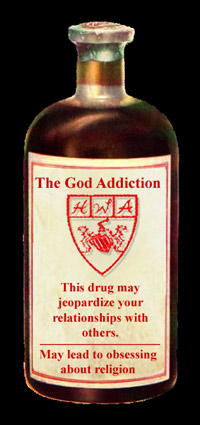
The God Addiction
Like drugs, alcohol and food, religion can be addictive
There is a toxic focus that comes with any addiction. The balance of an individuals life has shifted so that whatever the obsession is, it takes over. The addict becomes one dimensional in their thinking.
"For many have come in the name of God within the Armstrong movement, preaching their own version of
The World Tomorrow."
Someone who is addicted to God is using religion as an escape from their own lives. They begin to have ideas that God is directing every thought and action in their lives. As we have seen in a variety of Armstrong churches, the God addict will sacrifice their children, their relationships, jobs and families in what they believe is service to a higher power. And just like other addictions, eventually these twisted individuals only seek to increase the dose to reach new heights of fanaticism and the enlightened state. To reach this state of mind, they spend more time reading the bible, pray more and strive to reach others with their own version of scripture in order to share this imagined enlightened state of mind.
Some God addicts think that the nagging voice they hear, the self-generated commands, is the voice of God. They become angered when they realize that they don't have the mental or physical resources in which to carry out the commands of the voice. Others who do have the resources can land up being a serious threat to society. And then we have the dreamers, where visions of Christ appear before the fanatic. With every dream, they ask themselves: "Is there a message?" "What is the meaning?" They reach deep into the bible, feverishly searching out inspiration and guidance. Eventually they find some scripture and apply it to themselves.
In time, these fanatics can develop their own subculture. This subculture can be a group, a church or Internet following with its own language and thought patterns that are projected onto a unsuspecting public. When this behavior is carried to the extreme, when God becomes everything and there's no room for anything else, the individual has sunken deep into the abyss of a life destroying religious fanaticism.
Reverend Leo Booth who has a Facebook page dedicated to creating healthy spiritualism, has compiled a list of symptoms that can be associated with a religious addiction. They include:
Religious convictions are stated as black and white.
Isolation from people who do not share the same beliefs.
Think of the world and flesh as inherently evil.
Obsessive about praying, going to church, reading the Bible, attending crusades, watching television evangelists, sending money to missions.
Excessive fasting.
Hearing messages from God.
Judging others, often angry and violent toward "heathens."
Brainwashing - attempt to persuade family and significant friends to their way of thinking.
Compulsively talking about God, religion or quoting from Scripture.
Conflict of ideology with hospitals and schools.
Discourage thinking for oneself, doubting or questioning.
Sexuality seen as dirty or bad.
Cannot accept criticism.
Suffer tension, stress, often develop physical illnesses, such as eating disorders, depression and anxiety.
Often stare, go into trances.
Erratic personality changes.
![]()
All materials contained in this Website including but
not limited to the text and images, are protected by
copyright laws and may not be reproduced,
republished, modified, distributed, transmitted,
displayed, broadcast or otherwise exploited in any
manner without the express prior written permission
of the Editor. Any third party materials posted,
filed or otherwise communicated to this Website
become the copyrighted property of The Painful
Truth.
Copyright 2017 BY THE PAINFUL TRUTH | ALL RIGHTS
RESERVED
![]()
